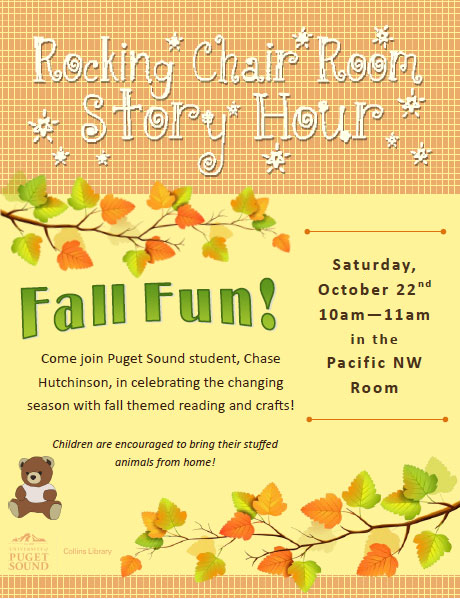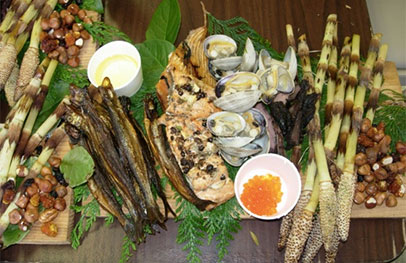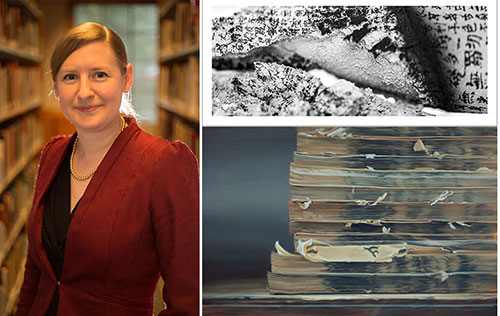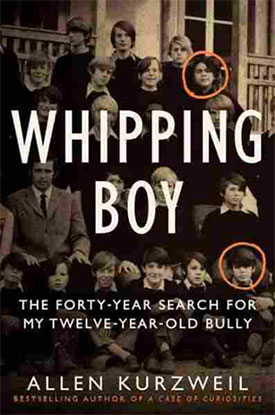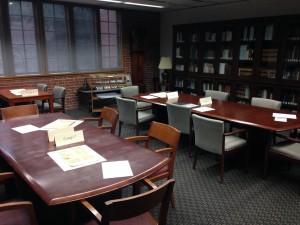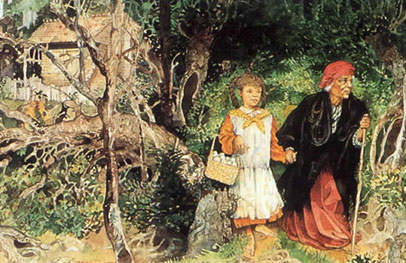Since Lin-Manuel Miranda’s mesmerizing production Hamilton: An American Musical took to the stage in early 2015, it has been an undeniable hit, generated a wealth of public commentary, and brought renewed energy and enthusiasm to musical theater and the study of American history. Is it even possible at this point to have missed the story of the “ten dollar founding father” and his meteoric rise on Broadway? For anyone who has managed to miss the accolades and awards, the critics, or the social media bonanza, Miranda’s musical provides a (mostly) historically accurate account of the life and death of Treasury Secretary Alexander Hamilton and the founding of the American nation by combining traditional elements of a Broadway musical with the lyrically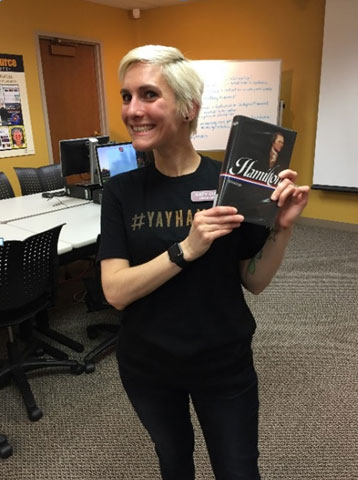 dense, complex musical style of hip-hop and rap and a racially diverse cast. Put plainly, Hamilton is much more than a rote, oft-told story of long-dead, white guys; it’s clever, emotionally engaging, relevant to our current political and social climates, and now showing up in classrooms all over the country.
dense, complex musical style of hip-hop and rap and a racially diverse cast. Put plainly, Hamilton is much more than a rote, oft-told story of long-dead, white guys; it’s clever, emotionally engaging, relevant to our current political and social climates, and now showing up in classrooms all over the country.
I haven’t always (ever?) been a serious history buff, but I love musicals, popular culture, critical analysis, and thorough research. When I first heard the Hamilton soundtrack in the fall of 2015, not only did I set about evangelizing the show to anyone in close range, I immediately started looking for opportunities to tap into its educational potential. What better way existed to fuel my obsession than connecting it to my work with undergraduates at the University of Puget Sound? The musical is remarkably well-researched, drawing heavily from historian Ron Chernow’s biography and primary source materials from Hamilton’s life and times, making it an obvious match for students of history; however, I’d like to suggest that Hamilton’s academic appeal stretches beyond its historical narrative to more varied disciplinary endeavors. As a librarian for the humanities, I frequently find myself supporting students as they examine (and sometimes grapple with) the personal, social, political, and structural contexts that shape creative work – most often in the realm of literature. When I discovered that my colleague, Alison Tracy Hale, Professor of English (and fellow Hamil-fan!), was interested in re-designing her early American literature course with an eye toward the musical, I knew I’d found my shot at a collaboration.
Designed to familiarize students with the history, literature, and culture of the eighteenth-century, Professor Hale’s current course uses Hamilton as a lens to explore Revolutionary America. Over the course of the semester, students immerse themselves in the raw materials that inform Miranda’s musical and undertake a variety of individual and group work, which hone skills in interpretation and research. As we prepared, Professor Hale and I found the richness of the source material combined with our own overwhelming enthusiasm for the musical to be a challenge when selecting just the right readings and assignments to shape the course (that said, we have plenty of ideas for further iterations!). Not wanting to stray too far away from intended learning outcomes or inadvertently teach a history lesson, we settled on a range of assignments that reflect the creative and interpretive work of scholars of literature. Assignments include ongoing annotations to the class compilation of the musical’s lyrics, using Annotation Studio; close readings and literary analyses of the musical; a research-based annotation assignment using primary documents; the revision or creation of a music number; and a final, researched and thesis-driven interpretive presentation. Through the course readings, assignments, and research opportunities, we hoped to enable students to make connections between the musical and its relevant historical and contemporary contexts, as they performed analytic work and made use of necessary resources and research methodologies used by scholars in the discipline. This is no small task, but it can be accomplished through thoughtful and intentional collaboration. What follows is a brief summary and assessment of how our ambitious endeavor to bring Hamilton to undergraduate literature students played out in one of their assignments.
For their first library-integrated assignment, students were placed into small working groups and tasked with conducting a close reading and analysis of a historical letter written by or to one of the figures from the musical. The letters were selected by Professor Hale and myself using the open-access correspondence collections of Founders Online. Because students were already reading so much of Hamilton’s own writing for the course, we attempted to offer additional voices and perspectives by selecting letters written by Thomas Jefferson, George Washington, Maria Reynolds, and other individuals associated with Hamilton’s story.
In preparation for their library session, students spent class time discussing the functions of letters in the 18th century, tried their hands at transcribing a digitized manuscript letter from Alexander Hamilton to his wife, Elizabeth, and generated a list key elements to consider for further research when reading their letters. Implicit in these activities was an emphasis on the purpose and process of close reading – an essential skill for the study of literature. While the students did not have to work with manuscript letters for their assignment, the transcription exercise proved to be an engaging and successful introduction to the process of analyzing a primary source. In the library session, we were able to apply the knowledge gained in this experience and the students’ list of criteria to an example letter from Angelica Schuyler Church to Thomas Jefferson in order to showcase a variety of research strategies and resources for them to use in the assignment. This approach, we hoped, would enable students to add depth to their analysis by encouraging an examination and evaluation of the letters based on elements beyond the content of the document (e.g., date, author, recipient, style, or purpose).
Using background research from tertiary sources to provide contextual details, students then created a “scholarly edition” of their group’s letter, similar to the kind found in a literary anthology. The scholarly editions included a formal headnote providing biographical and historical information about the letter’s author, recipient, and any historical, political, or social context significant to the content. Additionally, students annotated the text to provide further background information, clarifications, vocabulary, or literary insights. Students were encouraged to use the annotations as a means for providing relevant information to aid readers in the comprehension, analysis, or evaluation of the letter. Finally, they summarized their work and process, explaining the choices they made in their edition and their importance to understanding the original letter.
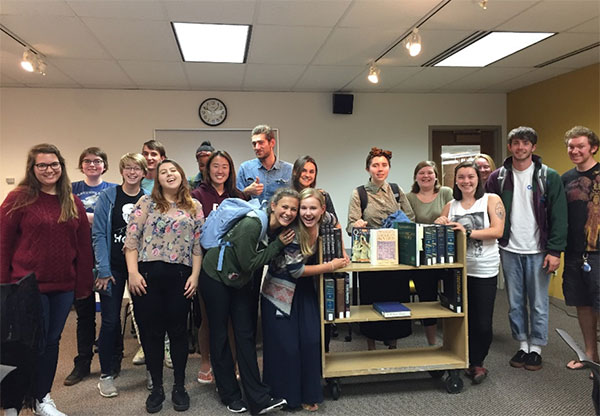
This fall, students in ENGL 234: American Literature & Culture aren’t throwing away their shot to take an academic dive into all things Hamilton!
While designing the assignment and accompanying library session required a not insignificant amount of preparation and collaboration, I can honestly say that this has been one of the most enjoyable teaching experiences I’ve had at Puget Sound. Not only have students responded enthusiastically to the source material – both in Hamilton the musical and the historical and literary works they’ve encountered in class – they’ve contributed to this material in meaningful ways through creative, interpretative, and research-based disciplinary work. The semester isn’t over yet, but based on our first library session and assignment together, I have no doubt that these students will continue to blow us all away as they examine, enhance, and re-imagine Hamilton’s story.
More information, accompanying resources, and a reading list for popular media coverage on Hamilton can found on the companion guide to ENGL 234.
By Katy Curtis, Humanities Librarian
University of Puget Sound
 Sometimes even the Faculty needs a bit of fun. In this photo some staff members from the 1926 faculty basketball team decided to dress up and take this treasure of a photo. As it is October and we are all gearing up for Halloween, maybe we can take some inspiration from these costumes! A couple members of this photo even have dorm buildings named after them here at University of Puget Sound. Regester and Seward, my own dorm namesake, are flaunting some creative outfits, though my personal favorite is Kelley in his bodacious bonnet. Check out the photo on A Sound Past!
Sometimes even the Faculty needs a bit of fun. In this photo some staff members from the 1926 faculty basketball team decided to dress up and take this treasure of a photo. As it is October and we are all gearing up for Halloween, maybe we can take some inspiration from these costumes! A couple members of this photo even have dorm buildings named after them here at University of Puget Sound. Regester and Seward, my own dorm namesake, are flaunting some creative outfits, though my personal favorite is Kelley in his bodacious bonnet. Check out the photo on A Sound Past!
